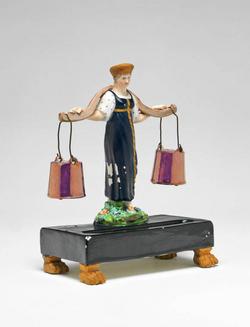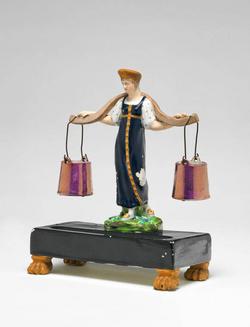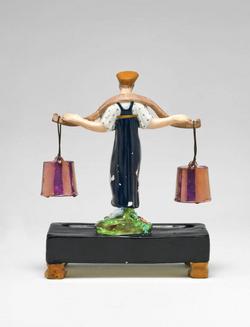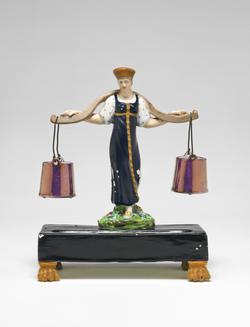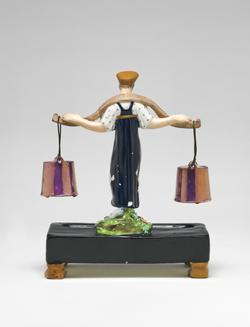Current Location: In storage
Titles
Milkmaid
Maker(s)
Production:
Enoch Wood
(Possibly)
Entities
Categories
Description
White earthenware painted in polychrome enamels and pink lustre
White earthenware, lead-glazed and painted in blue, navy blue, green, yellow, flesh pink, red, pale brown, and black enamels, and pink lustre. The figure is supported on a rectangular black base with a shallow depression across the front, standing on four yellow paw feet. The slender girl stands on round flower-strewn green mound situated behind the depression. She wears a brownish-yellow flat-topped hat, a white blouse with blue spots and a high-waisted navy blue dress with a yellow belt below her breasts and a yellow decorative strip beginning at the top of her bodice and descending to the hem. She holds out both arms to support a brown yoke from which two pink lustred buckets (A & B) are suspended on black wires. Each has three small hemispherical feet on the base.
Notes
History note: Captain Reynolds collection; sold en bloc to Messrs Gill & Reigate, London; one of thirty-five pieces bought from them by Mr Stoner; bought from him with other pieces in 1910 by Dr J.W.L. Glaisher, FRS, Trinity College, Cambridge.
Legal notes
Dr J. W. L. Glaisher Bequest
Measurements and weight
Height: 15.5 cm
Acquisition and important dates
Method of acquisition: Bequeathed
(1928-12-07)
by
Glaisher, J. W. L., Dr
Dating
19th Century, Early
Production date:
circa
AD 1820
Note
This figure is reminiscent of a larger porcelain figure of a Russian peasant wearing a blue dress and holding a yoke over her shoulders, but not wearing a hat made by the Imperial Porcelain Factory in St Petersburg about 1817. (Victoria & Albert Museum C.59-1933). In his Catalogue of the Glaisher Collection (1935), Rackham attributed this milkmaid to Wood & Caldwell and suggested that perhaps the Russian model might have been the inspiration for this figure, but it could have been made after Wood's partnership with Caldwell ended in 1818.
People, subjects and objects depicted
Components of the work
Decoration
composed of
enamel
( blue, navy blue, green, yellow, flesh pink, red, pale brown, and black)
lustre
( pink)
Surface
composed of
lead-glaze
Buckets
Diameter 2.8 cm
Height 2.8 cm
Base
Length 12.8 cm
Materials used in production
white
Earthenware
Techniques used in production
Moulding
: White earthenware, moulded in parts, assembled, lead-glazed, and painted in blue, navy blue, green, yellow, flesh pink, red, pale brown, and black enamels, and pink lustre
References and bibliographic entries
Identification numbers
Accession number: C.911 & A & B-1928
Primary reference Number: 76345
Old object number: 3213
Stable URI
Audit data
Created: Saturday 6 August 2011
Updated: Tuesday 30 April 2024
Last processed: Tuesday 29 July 2025
Associated departments & institutions
Owner or interested party:
The Fitzwilliam Museum
Associated department:
Applied Arts
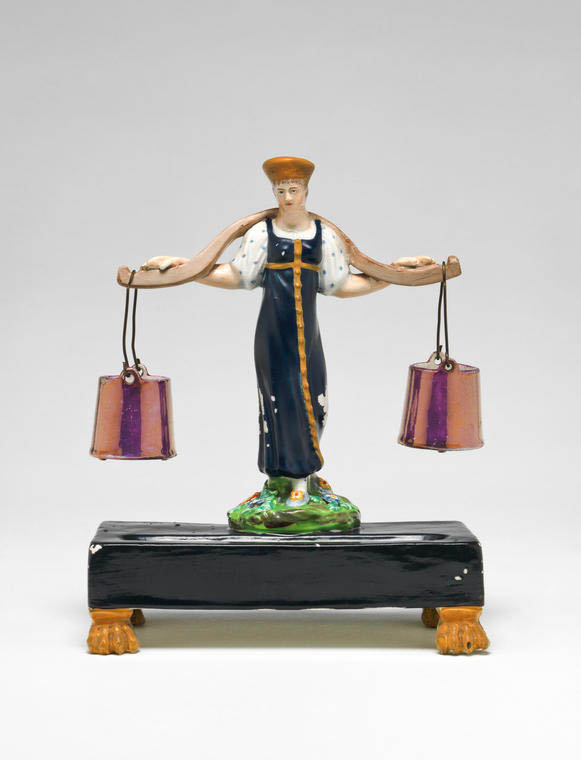
 IIIF Manifest
IIIF Manifest
